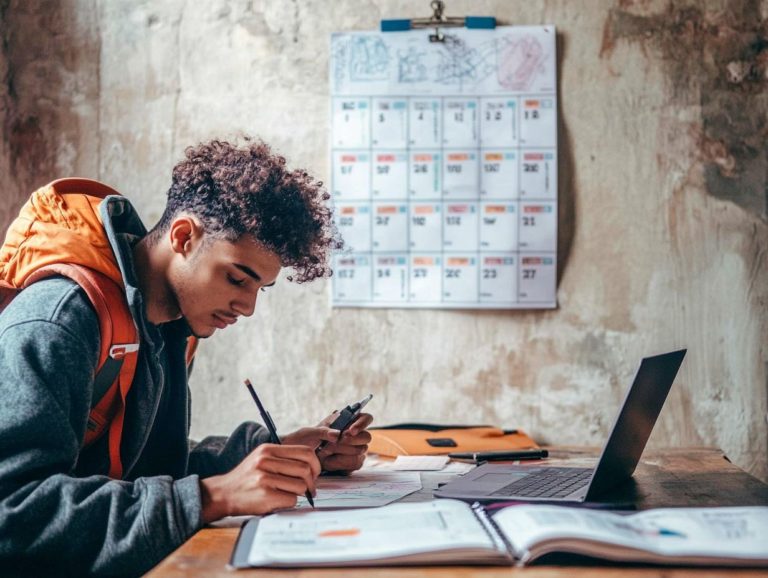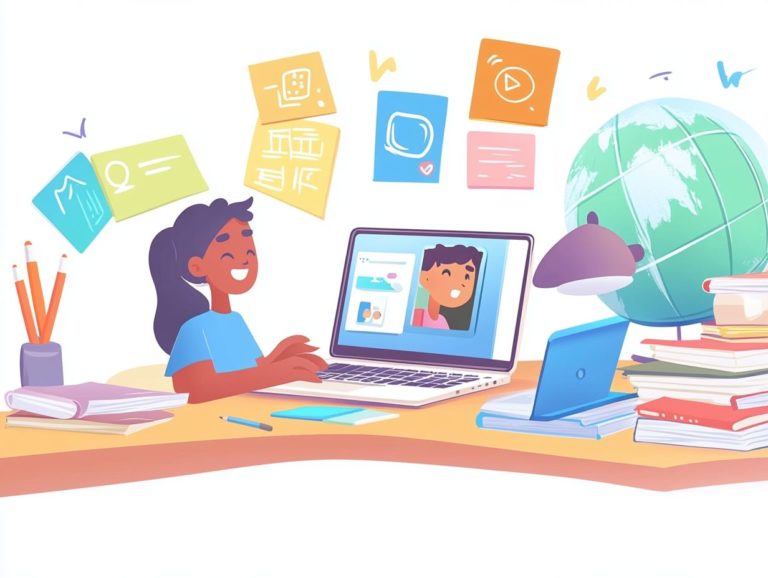Adapting Language Learning to Your Study Abroad Needs
Studying abroad presents an exhilarating adventure, providing you with the opportunity to explore new places and refine your language skills.
This guide outlines the essential steps for effective preparation, from selecting the right program to establishing achievable language goals. It tackles challenges such as language barriers and cultural differences while showcasing unique opportunities for immersion that await you.
You ll discover strategies to adapt your language learning approach, engage with the local community, and maintain your skills long after your journey is over.
Prepare yourself to fully embrace and maximize your study abroad experience!
Contents
- Key Takeaways:
- Preparing for Study Abroad
- Challenges and Opportunities of Studying Abroad
- Adapting Language Learning Strategies
- Maximizing Language Learning Opportunities
- Maintaining Language Skills After Study Abroad
- Frequently Asked Questions
- 1. How can I adapt my language learning to my study abroad needs?
- 2. Can I customize my language learning to meet my specific study abroad goals?
- 3. How can I make the most out of my language learning experience while studying abroad?
- 4. What should I do if I am struggling with adapting my language learning to my study abroad needs?
- 5. How can I maintain my language skills after studying abroad?
- 6. How can adapting my language learning to my study abroad needs benefit me in the long run?
Key Takeaways:
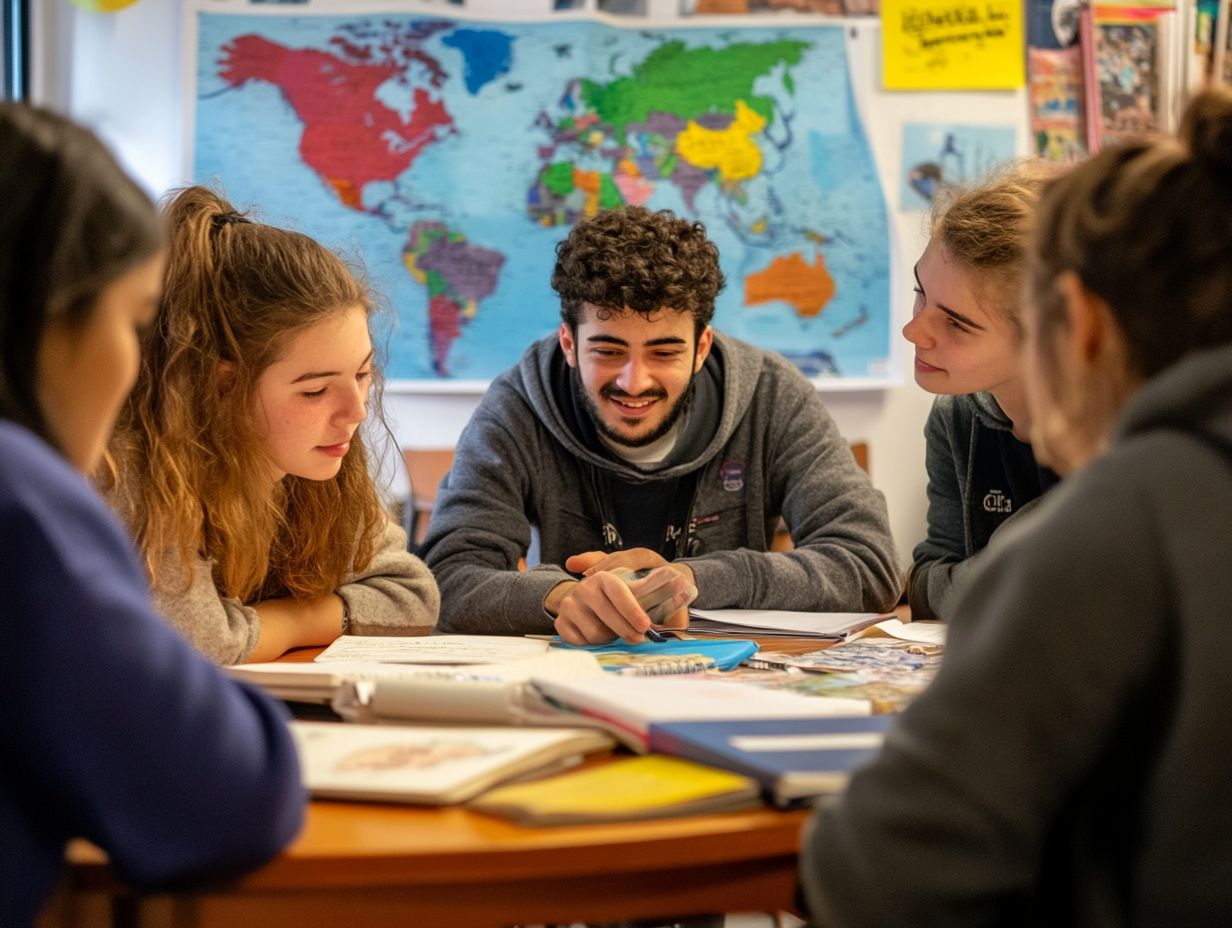
- Choose a study abroad program that aligns with your language learning goals.
- Embrace challenges and opportunities to immerse yourself in the local language and culture.
- Utilize effective study techniques and language exchange programs to adapt your language learning to your specific needs abroad.
Preparing for Study Abroad
Preparing for study abroad is a thrilling journey that requires careful consideration as you select the right program and set your learning goals. This experience boosts your resume and helps you grow personally through rich cultural experiences and the exploration of local traditions.
As you embark on your adventure to diverse destinations like Brazil or the U.S., you ll find yourself navigating academic expectations, overcoming language barriers, and developing strategies to cope with homesickness. Establishing a solid support system will be essential for your successful cultural adjustment, ensuring that you make the most of this transformative experience.
Choosing a Study Abroad Program
Choosing the right study abroad program is essential for maximizing both your cultural immersion and academic success while you re away from home.
When selecting a program, consider several key factors beyond just the curriculum. The reputation of the institution, like Temple University, significantly impacts how future employers and academic peers will perceive your experience. The location is another critical element; it can shape your journey, offering unique opportunities for cultural exploration and engagement.
Evaluate how well the program supports international students. Resources such as language assistance, housing options, and local integration activities can make all the difference, ensuring a smoother transition and a more enriching experience throughout your stay.
Setting Language Learning Goals
Setting clear language learning goals is vital for maximizing your study abroad experience and enhancing your ability to communicate effectively with locals. For further guidance, check out these tips for effective study habits abroad.
By defining specific, measurable objectives, you can track your progress more efficiently and maintain motivation throughout your language acquisition journey. It s important to set realistic expectations; understanding that language learning is a gradual process helps alleviate frustration and anxiety.
Incorporating a diverse range of reading materials like newspapers, novels, and local blogs will enrich your vocabulary and expose you to cultural differences, fostering deeper connections with the community. Actively engaging with locals encourages cultural adjustment and provides you with real-life speaking practice, which not only aids in your personal growth but also builds your confidence in communication skills.
Challenges and Opportunities of Studying Abroad
Studying abroad offers a unique blend of challenges and opportunities. You ll navigate language barriers and cultural differences, all while embracing a cultural immersion that promotes personal growth and emotional resilience.
As an international student, you might quickly feel homesick but don t let that hold you back! These experiences are not without their rewards; they equip you with valuable coping strategies and diverse perspectives that enrich both your academic journey and social life.
Language Barriers and Cultural Differences
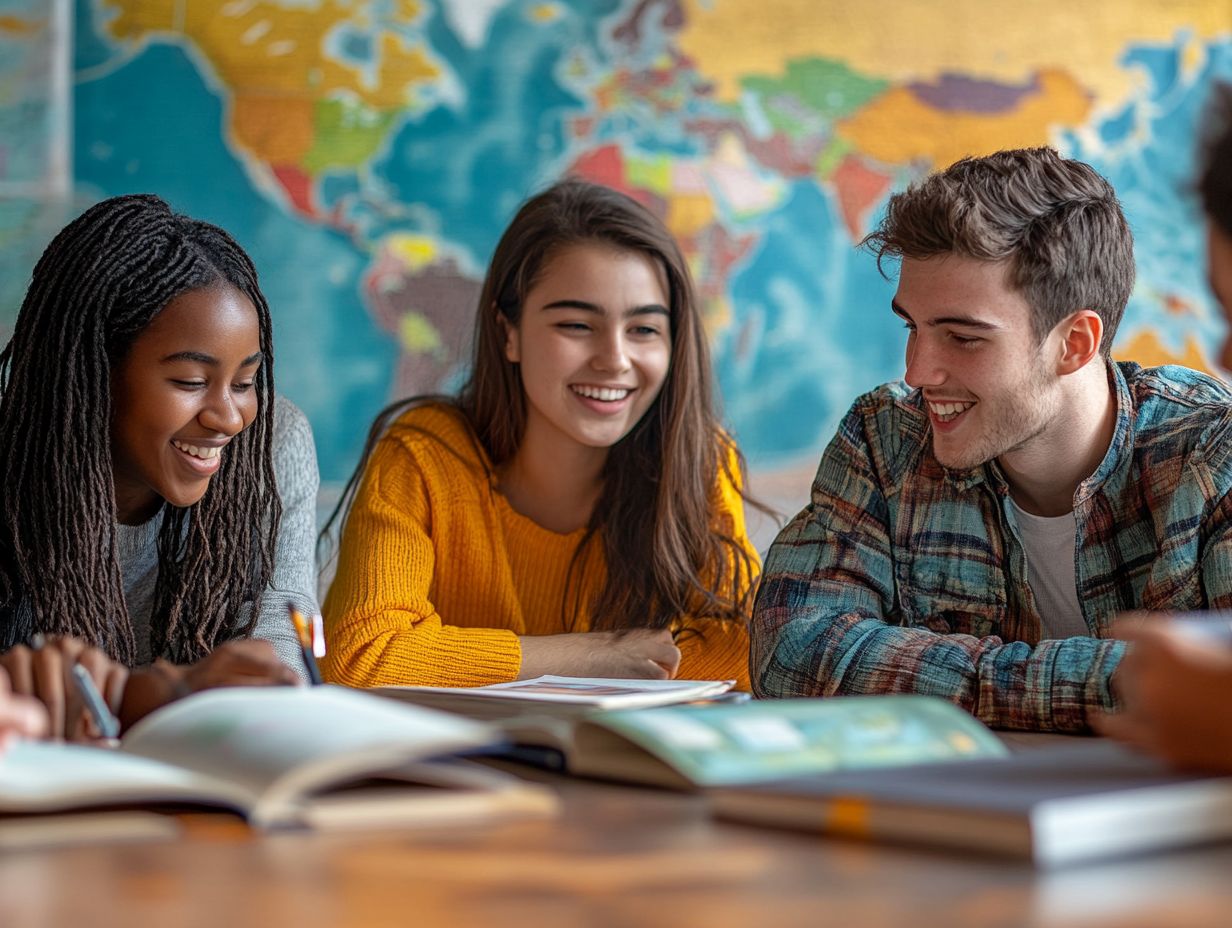
Language barriers and cultural differences can be tough for international students. However, they also help you become more aware and respectful of different cultures and improve your communication skills.
Navigating a new language can feel isolating, leading to loneliness and frustration. You can turn these challenges into valuable lessons about empathy and understanding among diverse groups.
To help you fit in socially and excel academically, try:
- Engaging in language exchange programs.
- Attending workshops focused on communication strategies.
- Connecting with local communities through shared interests.
Take the initiative to interact with native speakers! This not only boosts your language skills but also helps you make lasting friendships, enriching your educational journey and creating a sense of belonging.
Immersion and Cultural Immersion
Cultural immersion is a key part of your study abroad experience. It gives you the chance to engage with local customs and join in cultural events that encourage personal growth.
Seek out volunteering opportunities to contribute to community projects. This enriches your understanding of social dynamics and strengthens your connection with the local area. Attending local festivals and markets allows you to celebrate alongside residents, gaining insights that textbooks can’t provide.
Building genuine connections with locals through conversation can lead to unforgettable friendships and valuable lessons about daily life, traditions, and regional history. These experiences highlight the importance of meaningful interactions with the community, ensuring you leave with both academic knowledge and a deeper appreciation for the rich cultural tapestry that surrounds you.
Adapting Language Learning Strategies
Adapting your language learning strategies is crucial for improving your language skills and easing your cultural transition. For more insights, check out this guide on how to adapt your study techniques abroad during your study abroad experience.
By using effective study techniques and a flexible approach to problem-solving, you can maximize your engagement and significantly enhance your ability to communicate in the language of your host country. Additionally, knowing how to evaluate your study abroad options can further enrich your experience.
Effective Study Techniques
Implementing effective study techniques is vital for improving your language skills and understanding the role of language in studying abroad to meet academic expectations.
You will likely face emotional challenges during this transformative journey. It s important to adopt various methods that promote understanding, retention, and application of knowledge. Immersive practices, such as engaging with native speakers or participating in local cultural events, can significantly enrich your learning experience.
Using a variety of learning materials like interactive apps, podcasts, and videos can cater to your unique preferences and foster a deeper connection with the language. Embracing these techniques can help ease feelings of isolation and frustration, paving the way for greater academic success.
Utilizing Language Exchange Programs
Language exchange programs allow you to practice your new language with native speakers while helping them learn your language. This presents a fantastic opportunity to adjust culturally while refining your communication skills and making friends from diverse backgrounds.
These immersive experiences cultivate authentic relationships, offering invaluable insights into local customs and traditions. By engaging with native speakers, you explore a multitude of perspectives, enriching your understanding of various cultures. This interaction promotes an exchange of ideas and values, creating an open dialogue that nurtures empathy and global citizenship.
As you step out of your comfort zone, you will enhance your language proficiency and deepen the bonds with your language partners, resulting in unforgettable memories and shared experiences.
Maximizing Language Learning Opportunities
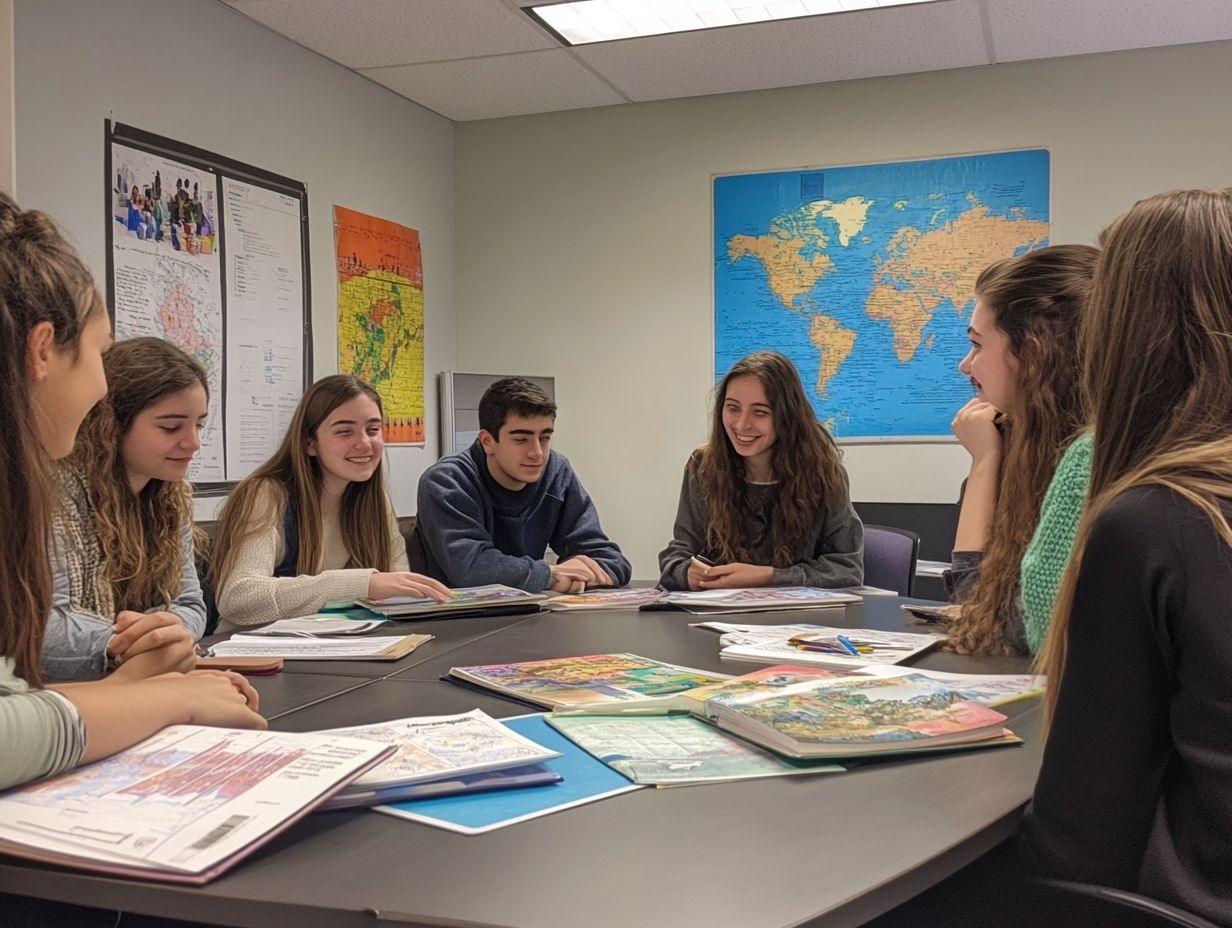
Maximizing your language learning opportunities means immersing yourself in the local community. Engaging in cultural activities and volunteering can profoundly enhance your personal growth and language skills.
By connecting with others in meaningful ways, your proficiency will blossom alongside your understanding of the culture.
Engaging with Local Community
Engaging with the local community is essential for making friends and gaining a deeper understanding of local customs. This connection makes it much easier to create friendships during your study abroad experience.
Actively participating in various cultural events like festivals, art exhibitions, and food fairs allows you to immerse yourself in the local way of life. These gatherings create organic opportunities to meet locals and fellow international students who share your interests, paving the way for valuable connections.
Joining community clubs or social groups focused on your hobbies or causes can lead to meaningful interactions. Volunteering not only benefits the community but also allows you to bond with like-minded individuals. This ultimately helps you build a supportive social network that enriches your time abroad.
Participating in Cultural Activities
Participating in cultural activities offers the chance to experience local customs firsthand. This transforms your study abroad journey into a rich tapestry of immersion filled with delectable food and vibrant cultural events.
Engaging in these activities enhances your understanding of diverse traditions. You will pave the way for lasting friendships and cherished memories. Exploring local cuisine through cooking classes or food festivals isn’t just about savoring traditional dishes; it also helps you grasp the historical significance behind each culinary delight.
Attending community celebrations or art exhibitions provides invaluable insight into the region’s heritage. This fosters a sense of belonging that can make your experience more meaningful.
Ultimately, these immersive experiences cultivate a deeper appreciation for the vibrant tapestry of cultural diversity, enriching your personal growth and global perspective.
Maintaining Language Skills After Study Abroad
To maintain your language skills after studying abroad, engage in ongoing practice and reinforce your cultural understanding.
Focus on effective communication. Implement self-care strategies, which are activities that help you take care of your mental and emotional health, to nurture both your linguistic abilities and your connection to the culture. This approach will enrich your experience and keep your skills sharp long after your journey has ended.
Continuing Practice and Improvement
Continuing to practice a language is crucial for maintaining your skills and enhancing effective communication in everyday situations.
Explore a variety of methods tailored to your unique learning style and emotional challenges. Engaging with online courses offers structured lessons and a rewarding sense of achievement. Language apps can be particularly beneficial for on-the-go practice, providing quick, interactive exercises to keep your motivation high.
Seeking out conversational partners significantly enriches your cultural understanding. This allows you to navigate the nuances of the language in real-life contexts. This proactive approach not only reinforces your vocabulary and grammar but also builds your confidence in communicating across diverse cultural landscapes.
Frequently Asked Questions
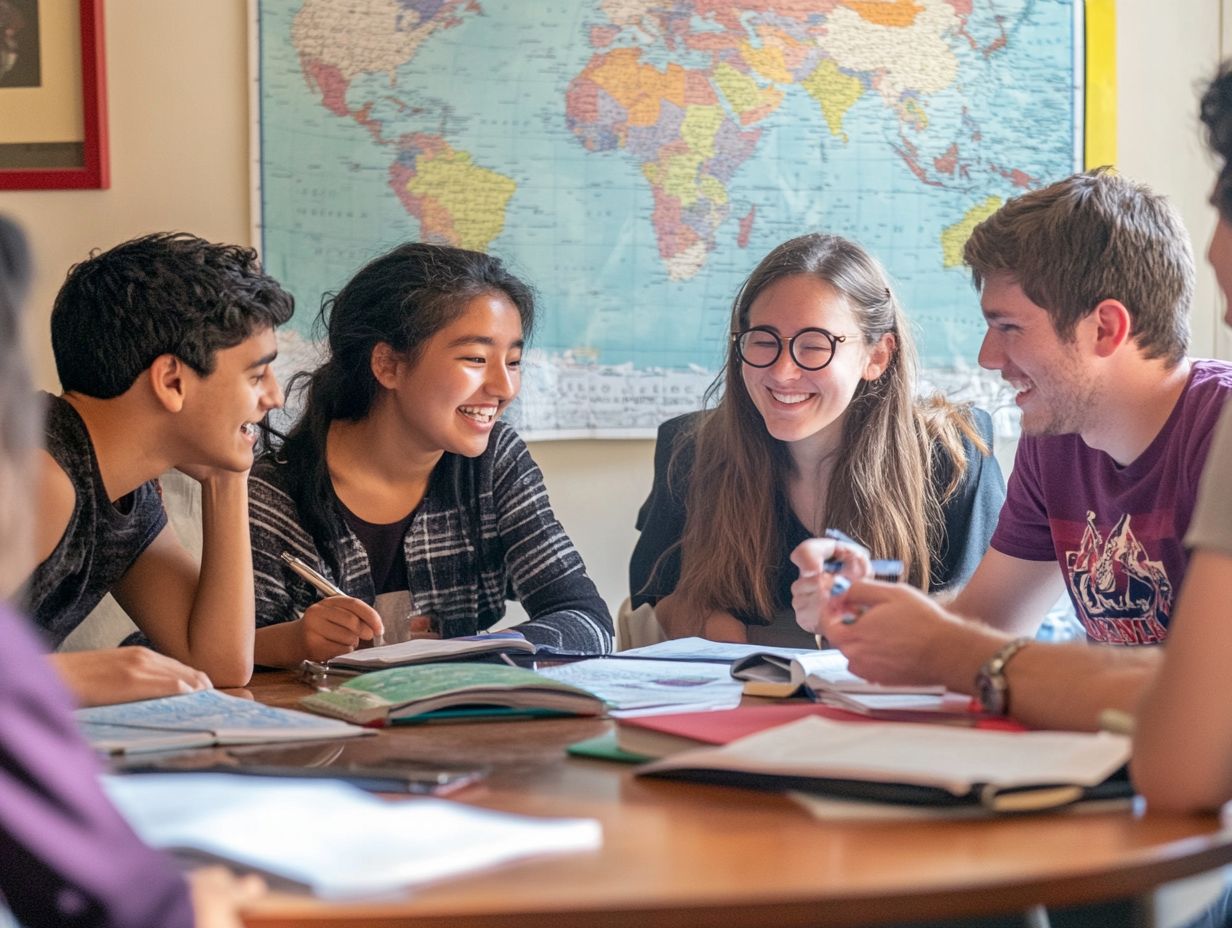
1. How can I adapt my language learning to my study abroad needs?
To adapt your language learning to your study abroad needs, first assess your current level of proficiency in the language. This will help you identify the areas to focus on and the resources you may need. For guidance on this process, check out our article on how to choose the right language for study abroad. Immerse yourself in the local culture and communicate with native speakers as much as possible to practice and improve your language skills.
2. Can I customize my language learning to meet my specific study abroad goals?
Yes, you can customize your language learning to meet your study abroad goals. If you are studying for a business program, focus on business vocabulary and practice communication with your tutor, while also considering navigating language requirements for study abroad.
3. How can I make the most out of my language learning experience while studying abroad?
To maximize your language learning while studying abroad, take advantage of available resources. Participating in programs where you practice speaking with native speakers, attending workshops, and utilizing language learning apps can enhance your experience. Additionally, exploring the benefits of bilingualism for study abroad students can further enrich your journey.
Use the language in your daily activities, like ordering food or asking for directions. This will help reinforce your skills!
4. What should I do if I am struggling with adapting my language learning to my study abroad needs?
If you struggle to adapt your language learning, reach out for support. Most study abroad programs offer resources, including guides on how to make the most of your study abroad experience, as well as tutors or language support services available.
Join study groups with other students to practice and learn together!
5. How can I maintain my language skills after studying abroad?
Don’t let your language skills fade! Keep practicing daily and incorporate the language into your life. Join language groups, attend events, and stay in touch with any native speakers you met.
Regularly review and practice through online resources or with a tutor.
6. How can adapting my language learning to my study abroad needs benefit me in the long run?
Adapting your language learning can offer many long-term benefits. It will not only improve your language skills but also enhance your cultural awareness, making you a more attractive candidate in the job market.
Additionally, being able to communicate in another language opens up opportunities for travel, work, and personal growth.

